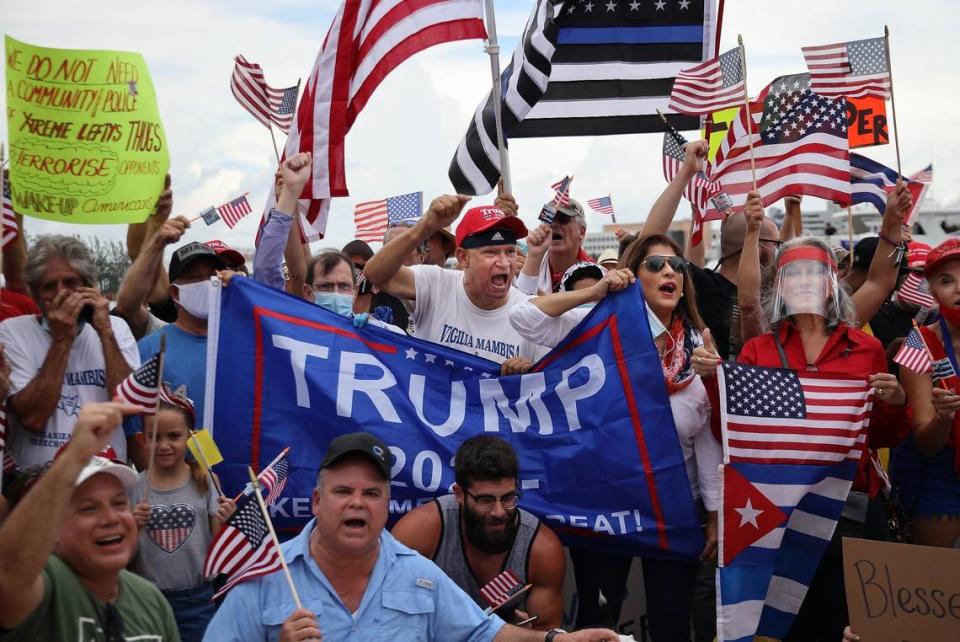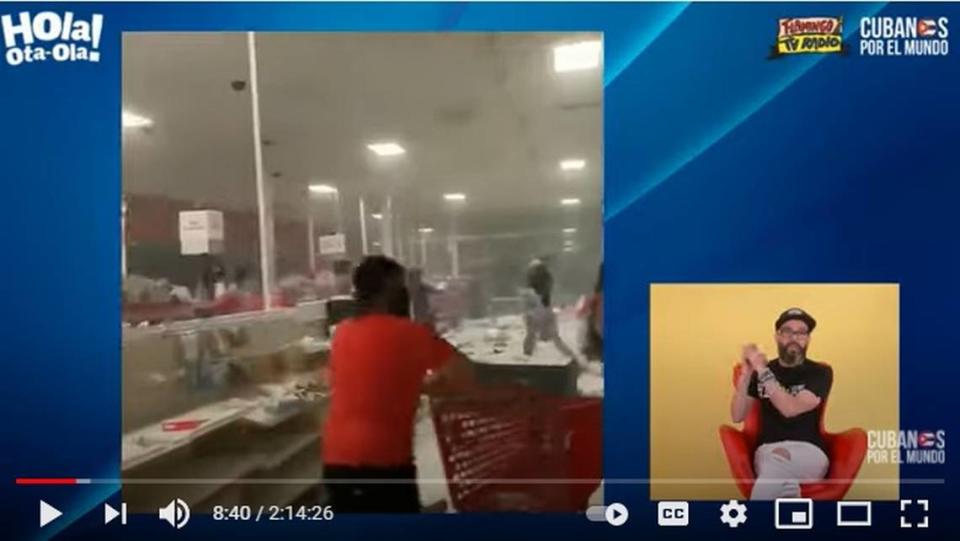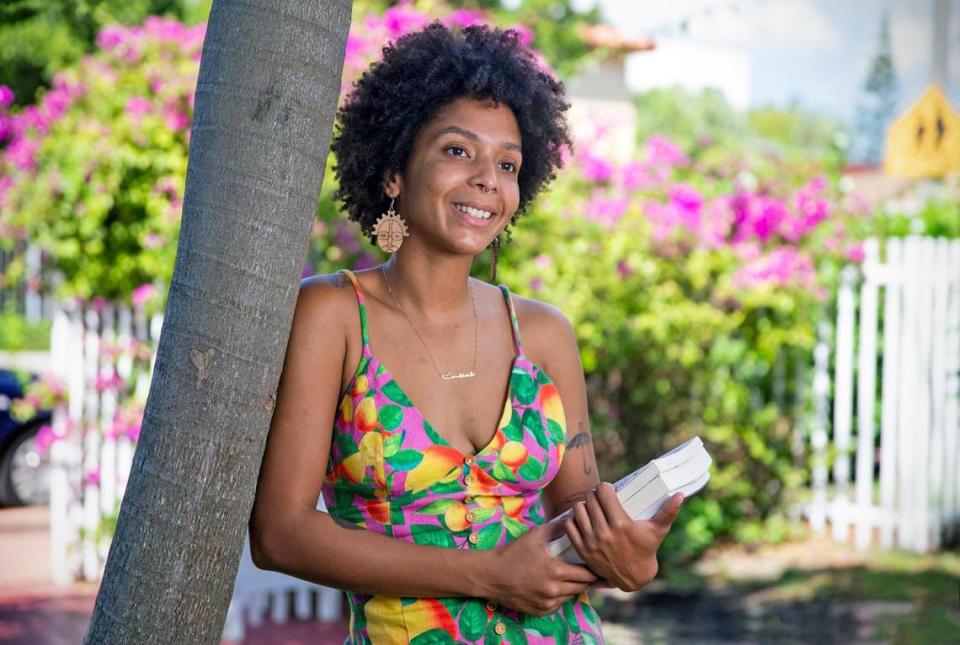Amid backlash against Black Lives Matter, Afro-Latinos find setbacks and opportunities
For South Florida native Yvonne Rodriguez, being Black in West Miami means coming in frequent contact with her white Hispanic neighbors’ casual racism, be it in the form of “off-putting jokes” or uncomfortable appellations (“What’s up, mulata? What’s up, mi negra?”). Even as a second-generation Cuban American, Rodriguez finds her Latin identity, and her ties to her parents’ homeland, put under constant questioning.
“It is psychologically exhausting to try to convince someone that you are just as much of a Latino as them,” she said.
In the summer of 2020, when a diverse cross-section of Miamians mobilized in near-daily protests to demand justice after the police killing of George Floyd, some Afro-Latinos expressed hope that a meaningful racial reckoning could be on the horizon for Miami’s Hispanic community. But Rodriguez wasn’t among them.
“I was not even mildly optimistic,” she said.
To an extent, Rodriguez feels she was proven right: Local Hispanic backlash against the wave of summertime activism materialized almost immediately — and has carried on through the November election and into 2021, thanks in part to alarmist rhetoric on social media and on the airwaves of influential Spanish-language media outlets.
Within weeks of Floyd’s death in Minneapolis, a much-discussed counterprotest to Black Lives Matter demonstrations was organized by the group Cubans4Trump in Miami Lakes, an overwhelmingly white Hispanic town. In that rally, as well as in other pro-Trump gatherings over the course of election season (including a “Law and Order” rally held in July), flags from Latin American countries were flown alongside the “thin blue line” flag, a symbol of support for law enforcement that has come to also signal opposition to Black Lives Matter and has been associated with white supremacist groups.

“They were literally carrying signs saying Black Lives Matter es socialista, es comunista,” said Raymond Adderly, an Afro-Cuban in Miami and one of the co-founders of Cubanos Pa’Lante, an alliance of progressive Cuban Americans. “That was the reality of Miami in the summer and all the way up until November, and even now.”
In the wake of the civil unrest sparked by Floyd’s killing, some Spanish-language media personalities repeatedly insinuated that those who protest violence are untrustworthy or dangerous. That includes radio host Carines Moncada, who made national news in October when she claimed on Actualidad Radio, Miami’s most popular AM radio station, that a co-founder of Black Lives Matter practiced “brujería,” or witchcraft.
“So you ask yourself, ‘Why are they destructive?’ ” Moncada said, in reference to protesters. “Because they are vibrating with the devil. They are vibrating with negativity. They are vibrating with the dark.”
In January, after a mob of Trump supporters attacked the U.S. Capitol, some in Miami’s Spanish-language media falsely claimed that Black Lives Matter and far-left groups like antifa were to blame for the chaos. In their respective coverage of the Capitol insurrection, Moncada’s co-host, Agustin Acosta, and popular Cuban YouTube influencer Alexander Otaola both stressed that the violence in D.C. paled in comparison to the unrest last summer (experts have called such comparisons “false equivalencies”).

“It’s very hostile content because it creates divisiveness and pits people against each other. … But in Miami, in South Florida, that’s king. They love doing that.”
Surveying the response to the Black Lives Matter movement across vast swaths of the local Hispanic population, Rodriguez’s assessment is incisive: “There’s been a complete backlash,” she said. White Hispanics’ view of Blackness “hasn’t gotten any better at all.”
“You crazy?” she added. “It’s gotten worse.”
Rodriguez feels that regression in the ways she is surveilled and profiled in her own neighborhood.
“Before at least they weren’t as obvious. Now, they are looking us up and down, like they’re making a police report. … And that hurts me. You know, I live in a Hispanic community. My people are the Hispanics. So these are my neighbors looking at me like this.”
For Matos Rondón, challenges unique to South Florida — where systemic racism combines with deep-seated colorism issues imported from Latin America — mean that a real racial reckoning could be more out of reach here than in other places.
“I mean, you do the work in the hopes that things change, but you’re not naive about it,” she said.
“Last year was the Big Bang of anti-racism curriculum. Everybody wanted a presentation. Everybody wanted a panel. … And then elections ramped up and all of that was dropped and things stayed exactly the same.”
DRAWING INSPIRATION FROM BLACK LIVES MATTER BACKLASH
Leilani Bruce was born in Miami to a Cuban mom and a Jamaican dad. She considers herself to be “afro-caribeña,” or Afro-Caribbean, and has traveled to Cuba regularly — her most recent visit was in February 2020, when she took part in a CubaOne Foundation trip focused on Afro-Cuban culture and history.
“Cubans often have the narrative that there’s no racism in Cuba, which is not true, and what that does is undermine the Afro-Cuban influence on Cuban culture,” she said. “So I think that [trip] got me started thinking about that and wanting to learn more about that part of the culture.”
Bruce decided to more seriously explore that interest, and bring others alongside her in that exploration, after witnessing the local reaction to the summertime protests in Miami. In the fall she helped launch the Candela book club, which centers around Black voices and Afro-Cuban stories (the name of the book club, which means flame in Spanish, is an acronym: it stands for Cuban-American Narratives and Dialogues for Equity, Liberation and Allyship).
“This summer, seeing how a lot of Cuban Americans were counter-Black Lives Matter and calling them terrorists and all kinds of things and just having a very racist attitude towards the whole movement, that started to get people talking,” said Bruce. The book club is a way to “drive the conversation forward and, learn about Afro-Cuban history, and unpack some of the issues around race in the Cuban community.”
Amid protests, young Latinos in Miami-Dade are working to root out parents’ racism
The book club — which currently boasts more than 100 members, most of them Cuban American — meets virtually every six weeks to discuss books that grapple with the Black experience in Cuba and in the Cuban diaspora. Participants have free rein to also bring up and discuss race-related issues they have encountered in their own lives or within their own families and communities.

In some ways, Candela is emblematic of the lasting impact that has come out of the 2020 protests in Hispanic-dominated Miami, especially among young people in progressive Latino circles: the use of online platforms and social media to keep addressing the issue of race and racism, even in the face of backlash elsewhere.
“I think I’ve seen in the last six to eight months more than ever a lot more conversations happening online about racism in the Latin American community, and the need to acknowledge Afro cultures and talk to racist family members, things like that,” said Bruce. “So I think these are small but significant things that I didn’t really see before.”
Marley Pulido-Vargas, who helped create the group Cubanos Pa’lante and is also Afro-Cuban, agrees.
“I think there is a long way to go … but what I have seen and what I love the most is that there’s a lot more Afro-Cubans and Afro-Latinos in Miami pushing and creating more spaces where they feel seen, and we are not letting white Cubans or white Latinx people dominate the conversation, because what they often do is say that we don’t need to talk about race,” he said. “Black folks have been reclaiming the narrative.”
BLACK HISTORY MONTH AS A CONVERSATION STARTER
A historian by training, Pulido-Vargas has helped orchestrate Cubanos Pa’lante’s Black History Month initiative: Throughout the month of February, the group’s Facebook page has been posting about Afro-Cuban history makers, in part to “make sure that our stories are not invisible anymore.”
“Black History Month is an opportunity to understand that Cuban history and Cuban-American history is Black history,” added Pulido-Vargas.
Among the historical figures discussed on the Facebook page are Paulina Pedroso and Antonio Maceo, prominent leaders in the Cuban War of Independence.
Cubanos Pa’lante’s Facebook project is seen as a course correction to the oftentimes reductive representation of Afro-Latinos in media coverage during Black History Month — and throughout the rest of the year.
“They uplift the same figures every time,” said Matos Rondón. “You got the all-stars like Celia Cruz and [Puerto Rican baseball Hall of Famer] Roberto Clemente. You’re literally going to get Don Omar, Tego Calderón and Ozuna. … So there’s very strategic ways of highlighting the levels of Blackness that people want to see. But you know, there’s more than just people that entertain you.
“For instance, the person that originated the idea of Afro-diasporic studies was Arturo Schomburg,” a key figure in the Harlem Renaissance. “He was a Black Puerto Rican man and he’s basically the father of Black archiving.”
Adderly, from Cubanos Pa’lante, would also welcome more nuance when it comes to discussing Black stories in the Hispanic context.
‘Where are my Latinos?’ Miami protesters call out police brutality and Latino silence
“It’s more than Celia. It’s my story. It’s my grandma’s story. It’s her family’s story. Like, I just found out recently that my grandma’s family were slaves on the island in Cuba, not slaves in the U.S.,” he said. “That’s a story to tell, you know, and it’s not being told because it’s overshadowed by the white Cuban story of success in Miami and how they’re able to open up a business and a shop.”
Black History Month celebrations — which, according to Rodriguez, have only “recently started to mention Black Latinos” — could be an opportunity to drive home the relevance of the Black experience to the U.S. Hispanic population, nearly a quarter of which identifies as Afro-Latino or Afro-Caribbean.
“None of the problems that Black Americans face in the U.S. are foreign to us. We also face racial profiling and police abuse of power and lack of representation,” said Pulido-Vargas. “So [during] Black History Month ... we have to work a little bit harder, so people know that we also exist and that systemic racism is no stranger to us.”

